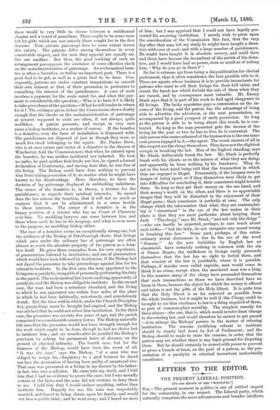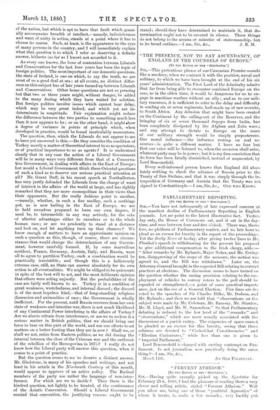LETTERS TO THE EDITOR.
THE PRESENT LIBERAL POSITION.
(TO THE EDITOR OF THE " SPECTATOR:1
STR,—The present moment in politics is one of critical import for the community, in one respect. The Liberal party, which naturally comprises the more adventurous and broader intellects of the nation, but which is apt to have that fault which gener- ally accompanies breadth of intellect,—namely, indecisiveness and want of unity in action, stands at a point where it has to choose its course. Such, at least, is the appearance to the eyes of many persons in the country, and I will immediately explain what that.question is to which I refer as deserving a definite answer, hitherto (as far as I know) not accorded to it.
As every one knows, the bone of contention between Liberals and Conservatives for the last four years has been the topic of foreign politics. The most important of our domestic questions, the state of Ireland, is one on which, to say the truth, we are most of us a good deal at sea ; at all events, no distinct differ- ence on this subject has of late years turned np between Liberals and Conservatives. Other home questions are not so pressing but that two or three years might, without danger, be added to the many during which they have waited for solution. But foreign politics involve issues which cannot bear delay, which may be very great indeed, and which yet are in- determinate in magnitude. Fair explanation might reduce the difference between the two parties to something much less than it now appears to be ; or on the other hand, it might show a degree of variance in points of principle which, when developed in practice, would be found incalculably momentous.
The question, then, which the Liberals do not appear to me to have yet answered is this :—Do they consider the condition of Turkey merely a matter of theoretical interest to us as spectators, or of practical importance to us as agents P It is understood clearly that in any case the action of a Liberal Government will be in many ways very different from that of a Conserva- tive Government, in dealing with affairs in the East of Europe ; but would a Liberal Government think these Oriental questions of such a kind as to deserve our serious practical attention at all ? Mr. Grant Duff, in his recent speech at Northallerton, has very justly defended the Liberals from the charge of want of interest in the affairs of the world at large, and has rightly remarked that they are more cosmopolitan in their views than their opponents. But the really dubious point is another, —namely, whether, in such a fine medley, such a seething- pot, as is now boiling in the East of Europe, we are to hold ourselves prepared to burn our own fingers, if need be, to intermeddle in any way actively, for the sake of ulterior advantages either to ourselves or to the whole human race ; or are we prudently to stand at a distance and look on, and let anything turn up that chances ? We know enough of matters to have an approximate opinion on .such a question as this, though, of course, there are circum- stances that would change the determination of any Govern- ment, however carefully formed. If, by some marvellous accident, France, Germany, Austria, Italy, and Russia, were all to agree to partition Turkey, such a combination would be practically irresistible ; and though this is a ludicrously extreme case, still, no State can answer absolutely for its own action in all eventualities. We might be obliged to be quiescent, in spite of the best will to act, and the most deliberate opinion that others were acting unjustly. But the probabilities of the case are fairly well known to us. Turkey is in a condition of great weakness, wretchedness, and internal discord ; the discord is of the most hopeless kind,—that of long-standing religious dissension and animosities of race ; the Government is wholly inefficient. For the present, until Russia recovers from her own state of weakness and intestine war, there is not much likelihood of any Continental Power interfering in the affairs of Turkey ? Are we also to refrain from interference, or are we to reckon it a serious matter in British politics, that we should bring our force to bear on this part of the world, and use our efforts to set matters on a better footing than they are in now ? Shall we, or shall we not, retire from Eastern politics, as we did during the interval between the close of the Crimean war and the outbreak of the rebellion of the Herzegovina in 1875 ? I really do not know how the Liberal party will answer this question, when it comes to a point of practice.
But the question seems to me to deserve a distinct answer. Mr. Gladstone, in many of his speeches and writings, and not least in his article in the Nineteenth Century of this month, would appear to approve of an active policy. The Radical members of the party use rather the language of non-inter- ference. For which are we to decide ? Then there is the kindred question, not lightly to be treated, of the continuance of the Asiatic Convention. Should a Liberal Government rescind that convention, the justifying reasons ought to be stated ; should they have determined to maintain it, that de- termination ought not to be covered in silence. These things do not belong to the arcana or minutim of statesmanship, but
to its broad outlines.—I am, Sir, &c., J. R. M.



































 Previous page
Previous page